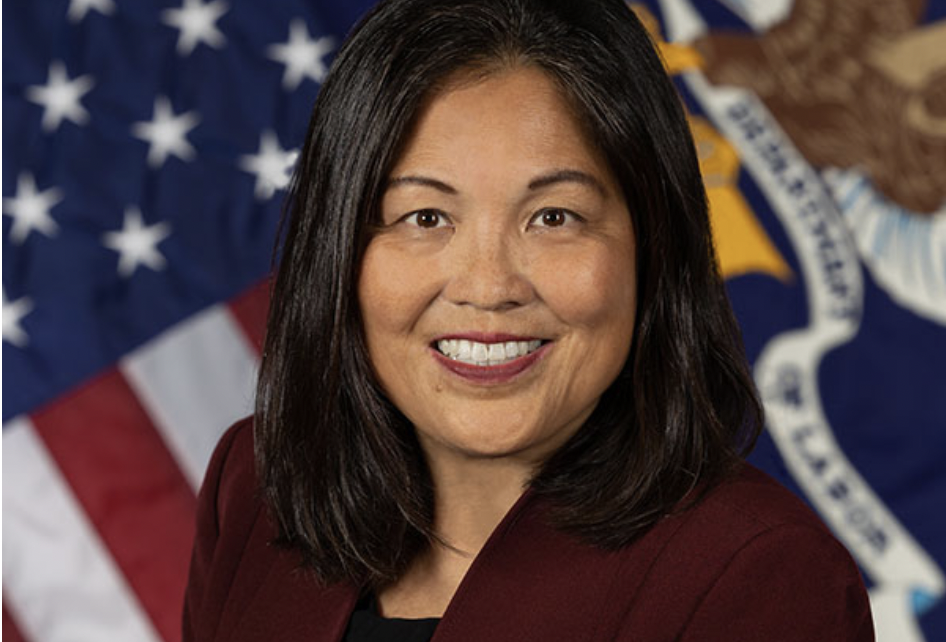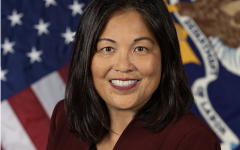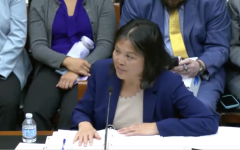
Deputy Secretary of Labor Julie A. Su. (Photo: dol.gov)
Julie Su Sued Over Freelancer Rule
‘Arbitrary,’ ‘Vague,’ ‘Capricious’ – Sounds Like Her
By Thomas Buckley, January 17, 2024 3:34 pm
The new federal rule Julie Su’s Department of Labor issued last week regarding freelance workers now has its first direct legal challenge, with the Pacific Legal Foundation yesterday filing a suit calling the new rule arbitrary, capricious, and, in fact, illegal.
The suit was filed on behalf of four freelance writers and editors in New Jersey and Georgia and demands the new rule be dropped immediately.
“The rule accrues power to bureaucrats to enforce the law,” said Pacific Legal Foundation attorney Wilson Freeman. “They intentionally created a rule that has no guidelines. It’s a Sword of Damocles hanging over every freelancer and the businesses that hire them.”
The Department of Labor referred requests for comment to the Department of Justice, which had not replied by publication time (though I don’t think I’m going out on a limb by being pretty sure they would have said: “The department has yet to review the case and does not comment on pending litigation as a matter of policy” so we’re not missing much.)
The issue of what is an independent contractor and what is an employee goes back to the New Deal and the passage of the Fair Labor Standards Act. That law governs overtime and such and refers to “employers” and “employees” but does not define what is an “employee.” Since then, courts around the country have issued rulings and opinions that have been all over the map, confusing the situation.
In 2021, the Trump administration issued (technically in its final days but it had been in the process for some time) a rule that references various factors to be considered in determining status but gave primacy to two of them: opportunity for profit and control.
Control means that if a freelancer sets their owns hours – “off to the dentist at p.m..” for example – and other factors like being able to choose their own equipment, etc. that would weigh heavily in any determination if their status as a proper contractor was challenged.
The Su rule takes the six factors – like control – to be considered and says nope, there all equal, pretty much, kinda-ish, maybe, we’re not telling you, take a guess how to balance them.
“The only thing the U.S. Department of Labor clarifies with this rule is a continued pattern of freelance busting against tens of millions of Americans whose clear preference is to remain self-employed,” said Kim Kavin, plaintiff and co-founder of Fight for Freelancers.
The rule adds a seventh factor for consideration which involves, well, pretty much anything else the bureaucrat making the determination thinks is relevant. From the suit:
These factors include “opportunity for profit or loss depending on managerial skill”; “investments by the worker and the employer”; “degree of permanence of the work relationship”; “nature and degree of control”’ “extent to which the work performed is an integral part of the employer’s business”; and “skill and initiative.” The 2024 Rule also includes a seventh, catch-all factor, stating that “[a]dditional factors may be relevant … if the factors in some way indicate whether the worker is in business for themsel[ves].”
In other words, the rule is clearly an “eye of the beholder” rule that bureaucrats and judges can interpret on a whim, giving labor unions an advantage if and when they challenge the “employee” status of a group of freelancers.
This may be surprising, but federal rules are meant to be written to be understandable and are “presumed to have a clear meaning.”
This rule doesn’t come close, Freeman said.
The rule is illegal, added Freeman, because it is based on a gross misinterpretation of the Fair Labor Standards Act. Also, it doesn’t meet standard for it even being necessary to replace the far clearer Trump-era rule. Also, surprisingly, a new administration actually has to give a plausible reason for making such changes and not base the move on pure politics (Biden’s gutting of border protection notwithstanding.)
But it was replaced not for clarification but for political reasons. Labor groups have praised the rule to the heavens while those impacted by it – like freelancers and companies that hire them – have roundly denounced the potential death sentence for their career.
Why fight over what would seem to be an obscure issue? Simple: you can’t unionize freelancers, but you can unionize employees. If millions of freelancers are forced to make the switch, union coffers will grow and then, in turn, so will the coffers of the Democratic Party.
“The plaintiffs have every reason to be worried about how the DOL’s anti-independent contracting rule will upend countless livelihoods and careers nationwide,” said Karen Anderson founder of Freelancers Against AB 5 and Visiting Fellow with the Independent Women’s Forum.
The fight against freelancing started here in California with the passage of AB 5, a law that essentially eliminated tens of thousands of jobs overnight. A number of powerful industries – like rideshare – got their own exemptions from the law – but still it brutally crushed a number of freelance and gig economy careers.
In the process of not being confirmed for the job of Secretary of Labor on a permanent basis (she’s acting secretary…is that like being a contract worker?…hmm,) Su repeatedly testified that she would not bring AB 5 to the federal level.
It is true that she not done so…exactly. AB 5 is actually clearer than the new federal rule – it set a bar to be legally freelancing preposterously high, but it did set a bar; the new rule does not.
That being said, Su’s intent with the new rule is to install as much of AB-5 as she thinks she can get away with.
So let’s call it AB-2-1/2 and hope the judge does the right thing.
- Reedley ‘Lab’ Prompts Legislation - April 26, 2024
- USC Cancels Graduation - April 26, 2024
- Where Does Gascon Go From Here? - April 25, 2024




The United Soviet States of America! Julie Su wants us all to be subjects of the state. She will punish and has punished those who are independent business owners making an honest living!
Free thinking, and a right to a livelihood is not allowed in the United Soviet States of America!
True enough, and this shows a fundamental understanding and empathy for less privileged and marginalized workers trying to support non-traditional households:
I know some people who are caretakers for a child or family member that cannot work Ms Su’s definition. She is deliberately, or incompetently, ruling from on high, the very definition of a monarchy.
Somehow in the article I noticed rideshare companies and maybe others somehow exempted themselves from the “ruling”. Like when law enforcement “exempts” themselves from any legislation foisted on the rest of us, especially law abiding citizens.
I used to read about “equal protection under the law” or something to that effect?
I’m so glad that AB5 and COVID has energized independent contractors to push back against the “accepted wisdom” that we’re a blight on the country. We independent contractors are the only people whose stake in the argument is so important. We need to just push, push, push.